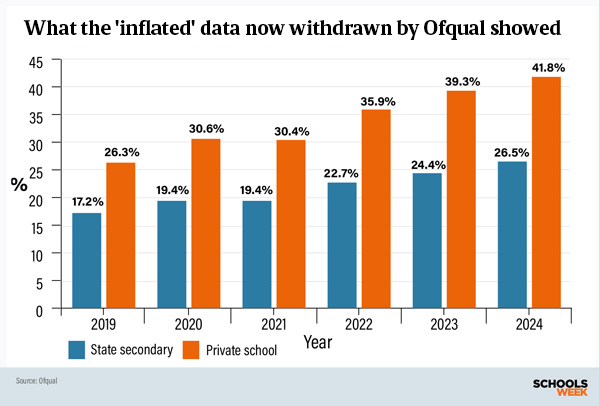Exams regulator Ofqual has admitted botched data “significantly overstated” the number of pupils receiving extra time in exams for the last decade.
Access arrangements are adjustments given for pupils with special needs, disabilities, or injuries to help ensure they are assessed fairly. They can include receiving 25 per cent extra time in exams, or the help of a reader or scribe.
Ofqual data suggests the proportion of pupils with access arrangements has soared in recent years. Pupils may receive more than one access arrangement, and the statistics do not include the total number of pupils who received access arrangements.
But the total number of access arrangements rose by 12.3 per cent in 2023-24 to around 625,000, Ofqual data showed, while 1,394,680 pupils were eligible to sit exams.
However, the regulator has now admitted the proportion of pupils getting access arrangements overall is actually closer to 19.5 per cent.
Late last year, concerns were also raised about a growing gap between the use of access arrangements between private and state schools.

Almost 42 per cent of private school pupils received extra time, according to the Ofqual data, far above the 26.5 per cent in state secondaries.
The education secretary told the Financial Times the divide as “a real concern”, and asked Ofqual to investigate “why so many children require this support”.
Following a review, Ofqual said it found issues with the statistics, dating back to 2014. The officials access arrangement statistics for the past decade have now been withdrawn.
Error in data
Ofqual’s statistics were based on data collected by exam boards. However the review found they “significantly overstated” the number of pupils receiving access arrangements.
According to the regulator, the error is due to the way the data was recorded and aggregated, such as including arrangements for students who did not sit exams that year, or including duplicate applications for the same student.
It said new analysis suggested the actual proportion of students receiving access arrangements was “broadly in line” with the proportion of students with special educational needs, with and without an EHCP.
There are now more than 1.7 million pupils in schools in England who fall into this category, equating to 19.5 per cent of pupils – up from 18.4 per cent in 2024.
New data based on an “improved methodology” will be published later this year following a “comprehensive” review of evidence, Ofqual said.
Ofqual could not say whether the corrected figures are likely to reflect a smaller gap between access arrangements for private and state schools. It said more details will be published later this year, once it has carried out its detailed analysis of the data.
Wrong data ‘frustrating’
Tom Bramley, executive director of research and analysis at Ofqual, said: “We are correcting the record as soon as possible. The access arrangements process has not changed, and students who received support did so appropriately.
“This issue is limited to our access arrangements dataset and our other statistics are not affected.”
Ofqual is “working closely with the Office of Statistical Regulation” on fresh data, and says it will also work with exam boards to improve data quality and reporting.
The regulator says there was “no change” for students who are receiving or applying for access arrangements, and those already granted remain “appropriate and valid”.
Tom Middlehurst, deputy director of policy at leaders’ union ASCL, welcomed the withdrawal and correcting of the data, but said it was “frustrating that the data was apparently incorrect in the first place”.
Ofqual ‘was aware of error’
A senior industry source also claimed the regulator had been aware of concerns about the data error for at least two years.
They argued that while exam boards collect the data, it is processed by Ofqual, and it was the regulator’s responsibility to check it.
They said one reason likely to contribute to the overstated number was that pupils who are granted access arrangements are kept on exam boards’ system for a period of around two years, to save them from reapplying each time they sit exams.
In response, Ofqual said it had always recognised limitations to the data, but the new analysis revealed the scale of the issue for the first time. The regulator added it decided to withdraw the statistics after discussions with the Office for Statistics Regulation, who they have been working with on the issue.
But Julie Robinson, chief executive of the Independent Schools Council, added: “Ofqual is supposed to be the trusted source for exam statistics and as a result of these significant errors, independent schools have wrongly seen their results undermined and their integrity questioned.
“We are pleased that the investigation instigated by the DfE will lead to a correction of the record and we hope an apology will be forthcoming.”
















Your thoughts